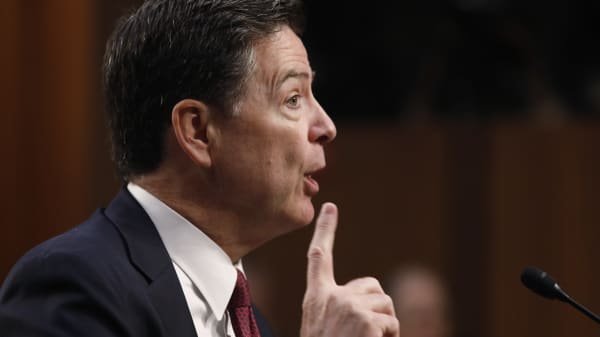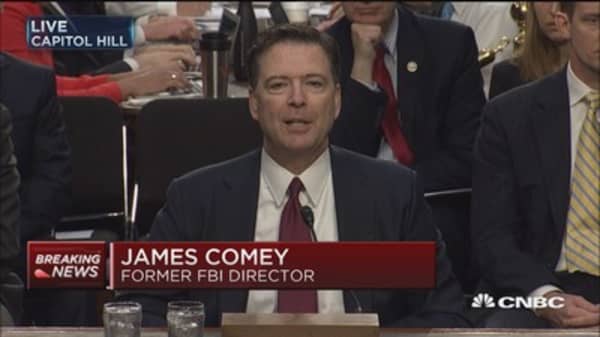Former FBI Director James Comey's Senate testimony Thursday will indeed have a big political impact in Washington. It will foster more partisan bitterness and more bad feelings about our political process and news media. But none of his testimony rises to the level of anything legally powerful enough to end the Trump presidency literally or figuratively.
The bottom line is that Comey spent a few hours Thursday telling the Senate committee that he felt uncomfortable and even stunned by President Trump's behavior. And he peppered that narrative with numerous damaging statements about the president's behavior and character, including basically calling him a liar:
I was honestly concerned he might lie about the nature of our meeting, I thought it really important to document. That combo I had never experienced before, it led me to believe got to write it down and write it down in a very detailed way.
But Comey also refused to describe President Trump's behavior as obstruction of justice and admitted that he did not even write a resignation letter or report the matter as a possible criminal act through the proper channels at the time. "That's (Special Counsel) Bob Mueller's job to sort that out," Comey said.
Comey came off as something of a savvy Washington survivor who knew how to keep his head above water in D.C. but without the guts or inclination to put a stop to the myriad ways his superiors from both parties kept trying to interfere with his job.
He described another such encounter with then-Attorney General Loretta Lynch who he said told him to refer to the Hillary Clinton email investigation as a "matter" and not an investigation. Comey said that was why he decided to make his public conclusions about that investigation on his own, but did not push back at Lynch directly.
Comey insists he just kept doing his job, and that's credible. But he still sounds like a very political animal in the "swamp" of Washington, D.C. So what else is new?
On the positive side, at least there was something for those of us who take no real comfort in any of our leaders committing actual crimes. We got that when Comey clarified to Senator Jim Risch of Idaho that a major story by the New York Times on February 14th reporting that there had been many meetings between the Trump campaign and Russian agents was simply not true.
Overall, "it was not true," Comey said. "The challenge -- and I'm not picking on reporters -- about writing stories about classified information is that people talking about it often don't really know what is going on. And those of us who actually know what's going on aren't talking about it. And we don't call the press to say, hey, you got that thing wrong about this sensitive topic. We just have to leave it there.
But getting back to the hard conclusions from this hearing, it produced little more than bad feelings and more character assassination. Remember that a sitting president can only be tried in the U.S. Senate. For that to happen, articles of impeachment must first be drafted in the House of Representatives.
With a Republican majority in the House, a former FBI Director refusing to describe his interactions with President Trump as a clear example of obstruction of justice isn't going to cut it. It seems inconceivable that any House committee would draft articles of impeachment over Comey's accounts, let alone get those articles passed by a committee or the full House.
Of
And they should, because a potential weapon in the overall effort to oust or mortally wound President Trump hasn't played out. It was an exciting hearing to be sure. But the Comey wild card is effectively off the table.
Commentary by Jake Novak,
For more insight from CNBC contributors, follow @CNBCopinion on Twitter.





